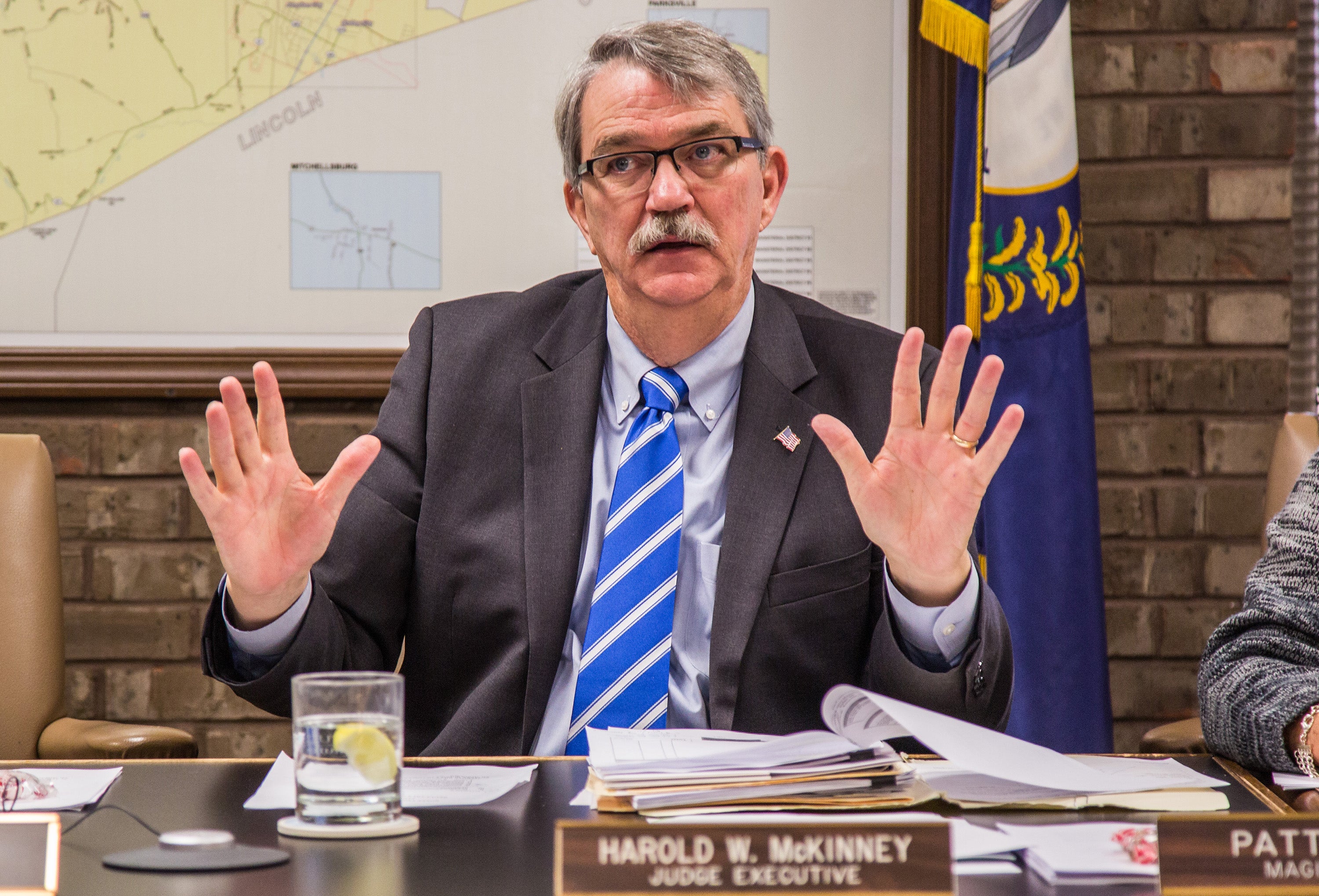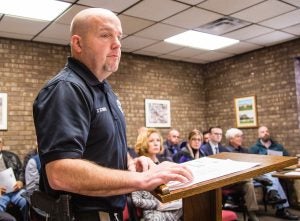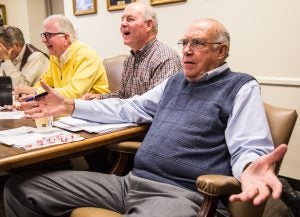Price for upgrading Boyle sheriff’s radio system higher than anticipated
Published 2:37 pm Thursday, January 11, 2018

- (Ben Kleppinger/ben.kleppinger@amnews.com) Boyle County Judge-Executive Harold McKinney guides conversation about a possible radio upgrade for the Boyle County Sheriff's Office Tuesday.
Upgrading the Boyle County Sheriff’s radios to maintain immediate communication with the Danville Police Department would be substantially more expensive than originally thought, Sheriff Derek Robbins told members of the Boyle Fiscal Court this week.
Buying the new radios will cost $24,040, as long as they’re bought before the current state contract price runs out on March 1, he said.

(Ben Kleppinger/ben.kleppinger@amnews.com)
Boyle County Sheriff Derek Robbins presents information about the cost of a possible radio upgrade to the Boyle County Fiscal Court Tuesday.
That cost had previously been discussed, but Robbins said now it’s come to light that the sheriff’s office will need to replace all four of its repeaters because the current ones won’t work with the new radios. At an estimated $10,000 per repeater, that would add as much as $40,000 to the cost of upgrading the radio system.
There is a possibility the sheriff’s office could get by with three repeaters, bringing the additional cost down to $30,000, Robbins noted.
Robbins also determined what it would cost to upgrade computers in the sheriff’s vehicles so they could use new features being added at the Danville 911 call center: $33,147.30.
In total then, to maintain the current level of communication between Danville and Boyle law enforcement and to tap into the new dispatch features, Boyle County would have to find a little more than $97,000.
Robbins said the radios and repeaters were more important to him than accessing the new dispatch features.
If Boyle County doesn’t purchase the radios before March 1, Robbins said the price will go up by around $13,000.
Boyle County magistrates were not happy with the new developments.

(Ben Kleppinger/ben.kleppinger@amnews.com)
Boyle County Magistrate Phil Sammons questions why the Boyle County Sheriff’s Office would want to communicate with the Danville Police Department.
“What was the chief, real reason for changing all these radios and so on in the police cruisers and what have you, to make a hardship on everybody?” Magistrate Phil Sammons asked. “I don’t know what the figure is it cost the city, but if it’s costing us this amount of money, they have about 34 officers. Why did (Police Chief Tony Gray) make such a decision knowing that it’s going to put such a hardship not only on the city, but also on the county government?”
“I don’t know the specifics on some of the details,” Robbins said. “Some of the stuff is for some of the covert operations they do. I think the timing is horrible, but I understand the reason for some of it.”
Robbins later explained the new radios Danville is switching to are essentially completely protected from outside entities listening in, which means law enforcement officers can be more confident no one knows what they’re up to when they’re working on a covert operation. The Boyle County Sheriff’s Office has encountered this problem itself, Robbins said:
“When we were making some drug buys, we had information that one of the drug dealers was renting a radio from a firefighter so that he could hear where we were because they had our frequency and he could freely listen to everything we did. And that way, he could operate knowing where we were — it makes it tough and it’s an officer safety issue. If he knows that we’re getting ready to close in on him because he heard it on the radio, he could set up an ambush or anything like that.”
Sammons pushed back on the idea the new radios would remain safe.
“These drug dealers are no dummies. What’s going to keep them from getting in on one of these frequencies now?” he asked.
Robbins said the “P25” system Danville is switching to requires you to “specifically have that type of radio.”
Sammons also questioned if Boyle County really needed to follow Danville’s lead on switching radios.
“Is it absolutely necessary that we have to follow what the city is doing? Change all these radios? Do we have to do this?” he asked.
“Just if we want to talk to them,” Robbins said.
“Why would we want to talk to them?” Sammons asked, and a few people laughed.
“Wait, wait — I understand that sounds funny, but this isn’t funny,” Judge-Executive Harold McKinney interjected. “This isn’t a funny situation, guys.”
At McKinney’s request, Robbins used an example of why communication between the two agencies is important that he’s used before: Danville could be pursuing a dangerous suspect, and a Boyle County deputy could be right on top of the suspect, but not know it. With the current radios, the deputy would hear Danville’s conversation’s and know immediately about the situation, upping the chances he could apprehend the suspect right then. If Danville switches to new radios and Boyle doesn’t, it’s possible Boyle County wouldn’t hear about the situation until 911 dispatch relays the information two or three minutes later.
“Three minutes goes by, I’m 3 miles down the road now and a woman was injured,” Robbins said hypothetically.
“The way I understand it, they really don’t want you involved anyway, sometimes,” Sammons said.
Robbins refuted that.
“I’ve spoke to (Chief Gray) and he’s been very welcoming to us going to operate off the same system that they are,” Robbins said.
McKinney said he believes it’s very important that the two agencies are able to communicate well. But some of the cost of the upgrades should not fall solely on Boyle County — under the newly signed 911 interlocal agreement, some of the costs should be covered by 911 funds, McKinney said.
Boyle County Treasurer Mary Conley agreed, and noted the cost of replacing repeaters is a clearly qualified expense that can be paid for with 911 funds the state provides.
McKinney said he thinks the radio issue needs to be addressed by the 911 advisory committee that was created by the new interlocal agreement. That committee is scheduled to meet for the first time at the end of January, but McKinney said he’d like to see that meeting bumped up so it can happen before the fiscal court’s next meeting on Jan. 23.
“We’ve got to make some decisions before the first of March, and the better equipped we are to know what we’re doing, we can make a better (decision),” McKinney said.
Thanks to the interlocal agreement, Boyle County has now passed on to Danville all of the 911-earmarked funds it had been holding in reserve — Conley said it was about $803,000. Those funds could in theory be used to pay for the repeaters.
“We wrote them a check for 800-and-odd-thousand-dollars, and then we’re going to get a bill for $40,000?” McKinney said. “That’s not something that we countenance with.”
Magistrate Jack Hendricks said dealing with problems like this is one of the main reasons the 911 advisory committee was created — the county didn’t appreciate how it seemed like Danville would take unilateral action on 911 issues.
“They make all these changes down there and we know nothing about it, (Robbins) knows nothing about it, nobody else knows anything about it,” Hendricks said. “But they’re so free with money — I guess they got plenty; they don’t have to worry about us spending $100,000.”
Hendricks was supportive of the benefits the new radios could bring, however. He said later in the meeting he believes the new radios will be “totally restricted” and that will help with problems of too many people on an emergency frequency.
“Too many people had the frequencies that we’ve got right now. I think what their plan is … these frequencies will not be given out to everybody,” Hendricks said. “The fire department won’t have them because unfortunately, the fire department’s got about 300 radios out there and that’s awfully hard to control. That’s just one of the problems. Too much traffic was on the frequencies and they got drowned out sometimes in emergencies.”
Hendricks agreed with McKinney that a resolution should be found through the 911 advisory committee.
“I think the committee that has been formed now under our new agreement is going to help solve some of these problems in the future,” he said.






